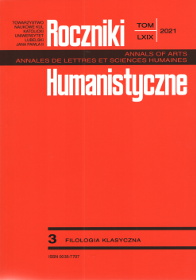The Ideal State of Hippodamus from Miletus: In Search of Model Consistency
Abstract
The author of the article focuses on the mysterious vision of the ideal state, attributed to Hippodamus of Miletus (who lived before Plato), and is known from the testimonies of Aristotle (Politics 1267b22-1268a14) and Stobaeus (Florilegium IV, 1, 93, 1 sqq.). The author shows a possible coherence between those testimonies generally considered to be divergent, as well as a more far-reaching coherence between the political concept and the urban planning projects of Hippodamus (known mainly as an architect who designed the way a number of cities at the time were developed), which implemented the model of a welfare state, whose infrastructure was adapted for the needs of all citizens. The final part of the article is devoted to the influence of the political concept of Hippodamus on the Platonic vision of an ideal polis; this influence—contrary to frequently expressed opinions—does not in any way clearly indicate its presence in Politeia of Plato, who seems to emphasize his independence and originality of the political solutions he presents.
References
Bise, Pierre. „Hippodamos de Milet”. Archiv für Geschichte der Philosophie, t. 35, nr 1-2, 1923, s. 13-42. DOI: 10.1515/agph.1923.35.1-2.13.
Burgin, Mark. „Platonic Triangles and Fundamental Triads as the Basic Elements of the World”. Athens Journal of Humanities & Arts, t. 5, nr 1, 2018, ss. 29-44. DOI: 10.30958/ ajha.5.1.2.
Dawson, Doyne. Cities of the Gods: Communist Utopias in Greek Thought. Oxford University Press, 1992.
Domagała, Edyta. „Miłość drogą do Piękna-Dobra-Prawdy, czyli o Platońskiej metafizyce miłości”. Annales Universitatis Mariae Curie-Skłodowska. Sectio I: Philosophia-Sociologia, t. 34, 2009, ss. 77-95.
Gajda-Krynicka, Janina. „Pitagorejski model ustroju doskonałego”. Roczniki Humanistyczne, t. 52, z. 3, 2004, ss. 55-96.
Gorman, Vanessa. „Aristotle’s Hippodamos (Politics 2.1267b22-30)”. Historia: Zeitschrift für alte Geschichte, t. 44, nr 14, 1995, ss. 385-395.
Hermann, Karl Friedrich. Disputatio de Hippodamo Milesio ad Aristotelis Politicam, II, 5. Elwert, 1841.
Hogan, John. „Hippodamus on the Best Form of Government and Law”. Political Research Quarterly, t. 12, nr 3, 1959, ss. 763-783. DOI: 10.1177/106591295901200309.
Jowett, Benjamin. The Politics of Aristotle [vol. II, part I, containig the notes]. Clarendon, 1885.
Newman, Wiliam Lmbert. The Politics of Aristotle. Vol. I: Introduction to the Politics. Cambridge University Press, 2010 [wyd. 1: 1887].
Paden, Roger. „The Two Professions of Hippodamus of Miletus”. Philosophy and Geography, t. 4, nr 1, 2001, ss. 25-48. DOI: 10.1080/10903770124644.
Peterson, John. „Aristotle’s Ridicule of Political Innovation”. Ramify, t. 2, nr 1, 2011, ss. 119-130.
Stein, Ludwig. „Die staatswissenschaftliche Theorie der Griechen vor Aristoteles und Platon”. Zeitschrift für die gesammte Staatswissenschaft, t. 9, 1853, ss. 115-182.
Świercz, Piotr. Jedność wielości. Świat, człowiek, państwo w refleksji nurtu orficko-pitagorejskiego. Wydawnictwo Uniwersytetu Śląskiego, 2008.
Tigerstedt, Eugène Napoléon. Interpreting Plato. Almqvist & Wiksell International, 1977.
Winspear, Alban Dewes. The Genesis of Plato’s Thougt. Wyd. 2. Transaction Publishers, 2011.
Zeller, Eduard. A history of Greek philosophy from the earliest period to the time of Socrates. Tłum. Sarah Frances Alleyne. Longmans & Co., 1881.
Zygmuntowicz, Dorota. „Rola myślenia utopijnego w starożytnej Grecji”. Przegląd Filozoficzny – Nowa Seria, t. 23, nr 2, 2014, ss. 107-119. DOI: 10.2478/pfns-2014-0033.
Copyright (c) 2021 Roczniki Humanistyczne

This work is licensed under a Creative Commons Attribution-NonCommercial-NoDerivatives 4.0 International License.





